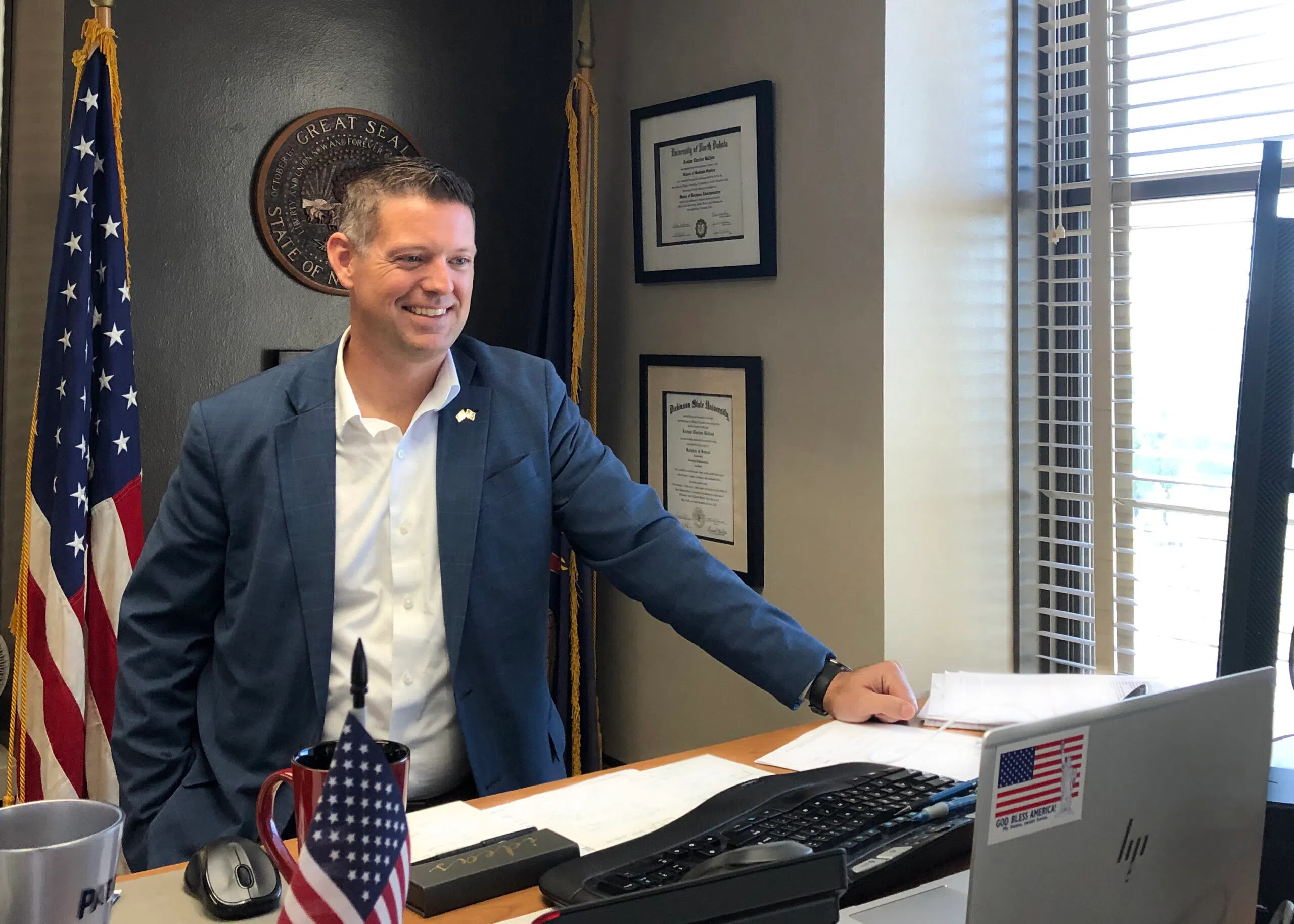
The Legislature commissioned a performance audit of the State Auditor’s Office during the 2023 session, which an accounting firm has agreed to conduct for $285,000. State Auditor Josh Gallion, pictured, said his office already routinely receives external assessments. (Photo provided by the State Auditor’s Office)
BY: MARY STEURER
BISMARCK, N.D. (North Dakota Monitor) – An audit of the North Dakota’s Auditor’s Office is delayed several months after the lowest bidder backed out, upping the cost of a review the state auditor calls a waste of taxpayer money.
The performance audit was requested by the 2023 Legislature after local governments voiced concerns about the cost of the agency’s services.
“We felt that, regardless of those political entities, the auditor should, in fact, be audited,” House Majority Leader Mike Lefor, R-Dickinson, said. “Every department should be.”
The 2023-2025 budget for the Office of Management and Budget set aside $500,000 for the performance audit.
The budget puts Lefor in his capacity as chair of Legislative Management in charge of arranging the audit.
The first request for proposals, which Legislative Council issued in July 2023, received no bids. After that, Legislative Council opened up bidding to a wider area, said Allen Knudson, Legislative Council’s legislative budget analyst and auditor.
Two companies responded: Minneapolis-based firm RSM submitted a bid for $40,000, and Forvis, based in Denver, put in a bid for $285,000.
Lefor said he and Legislative Council staff had a conference call with RSM to make sure the firm understood the project before they signed the contract.
“The bid, as we look back, was very low, but they assured us they could do it,” Lefor said.
But at some point after the agreement was signed, the firm indicated it was no longer comfortable with conducting a performance audit — which must follow official standards — and wanted to perform an informal assessment instead.
“We had a couple of meetings, and all of a sudden they started talking about an assessment,” Knudson said. “We just realized it’s not gonna work.”
RSM notified Legislative Council in an April 30 letter that the firm was terminating the contract. The state didn’t have to pay any money to RSM.
Both Knudson and Lefor said the firm didn’t explain why it backed out of the agreement.
The Legislative Council signed a contract with the other accounting firm, Forvis, in late May for $285,000.
“We lost a couple of months, but it should still be ready by the next legislative session — which is kind of what we wanted anyway,” Lefor said.
The Legislative Audit and Fiscal Review Committee was informed of the change during its June meeting. Legislative Council Fiscal Analyst Toby Mertz said during the meeting the audit will start in August and be completed sometime in October or November.
State Auditor Josh Gallion said his office is already routinely evaluated. The agency undergoes an external peer-review audit every three years and a financial statement audit every two years, he said. The agency’s mineral royalty program also receives its own additional peer-review audit every three years.
“While I think this audit is unnecessary and redundant — I think it’s a waste of taxpayer money — we will still go through this process to see if there are opportunities for us to improve our processes,” Gallion said.
Gallion said the three other audits of the Auditor’s Office are much less expensive than the performance audit is expected to be. The agency’s most recent peer-review audit cost approximately $20,000. He said the previous financial statement audit was about $11,000. The mineral royalty team peer review audit, meanwhile, is funded by a federal grant.
According to the 2023-2025 OMB budget, the performance audit will gauge the “efficiency and effectiveness” of the Auditor’s Office according to industry standards. The audit must assess:
- How long it takes the Auditor’s Office to conduct audits
- How the office tracks and allocates staff hours
- How it bills audited entities
- How it ensures the quality of its services, and
- How well it communicates with governmental groups, organizations and the public
According to Legislative Council’s contract with Forvis, the audit will cover fiscal years 2020 through 2023, which ended June 30, 2023.
The assessment period includes the COVID-19 pandemic, Gallion noted — a time when the agency’s processes and procedures were different than normal.
“We went from doing our audits on-site to not being able to travel. We have a very rural state where not everything is digital,” he said. “Everything took a little bit longer. Communication was challenging.”
Gallion also said his office has made positive changes since last year that won’t be reflected in the performance audit.
For example, in response to concerns about the costs of the agency’s audits, the Auditor’s Office now provides cost estimates before clients agree to the assessment, Gallion said. The proposals include not-to-exceed clauses, and clients must sign off on any proposed changes.
“It’s looking at a time period where some of the things that they’ll evaluate, we’ve already adjusted,” Gallion said.
During the 2023 session, lawmakers also passed a bill to require fewer local governments to pay for audits from the Auditor’s Office every two years. Under the legislation, local governments that receive less than $2 million in annual revenue undergo a simpler financial review. Previously, that ceiling was $750,000. The Auditor’s Office supported the amendment.



Comments